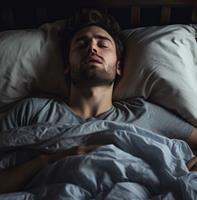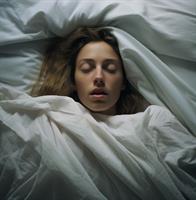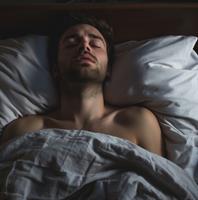Imagine waking up every morning feeling exhausted and unrested, only to learn that your post nasal drip snoring is the culprit. What if we told you that there is a hidden connection between your snoring and post nasal drip? Uncovering this truth might just be the solution that brings you the peaceful, restful sleep you’ve been craving.

Key Takeaways
-
Post Nasal Drip is a condition caused by allergies, sinus infections or colds which can lead to snoring.
-
Various treatments and lifestyle changes may help reduce post nasal drip and snoring.
-
Chronic snoring should be addressed promptly as it can lead to serious health issues. Seek medical advice for proper diagnosis and treatment.
Understanding Post Nasal Drip
Post Nasal Drip is a condition where excess mucus accumulates in the back of the throat, often caused by allergies, sinus infections, or common colds. Our nasal passages are designed to keep the air we breathe clean and moist, but sometimes they produce too much mucus, leading to chronic nasal congestion and other issues.
Allergic Rhinitis
Allergic Rhinitis, commonly known as hay fever, is a condition characterized by persistent nasal congestion resulting from inflammation and congestion. It can disrupt smooth nasal breathing and contribute to post nasal drip snoring. Allergens like house dust mites and pets may be responsible for chronic rhinitis, causing inflammation and congestion in the nasal passages.
Various treatments are available for Allergic Rhinitis, such as over-the-counter oral decongestants, sodium cromoglicate nasal spray, and immunotherapy as approved by medical professionals. These treatments can help alleviate sinus related snoring.
However, being aware of the potential side effects of over-the-counter oral decongestants, such as insomnia, irritability, nervousness, heart palpitations, and elevated blood pressure is necessary. Steroid nasal spray serves as an alternative treatment for post nasal drip and snoring.
Sinus Infections
Sinuses are air-filled cavities located in the frontal region of the skull, and a stuffy nose can be a result of sinus congestion or post nasal drip. Healthy sinuses contain only air, and maintaining healthy sinuses can help alleviate sinus-related snoring.
Sinus infections, such as chronic sinusitis, can lead to post nasal drip and snoring, as they cause inflammation and blockage in the nasal passages. A deviated septum, blocked, clogged, or misshapen sinus cavities may contribute to snoring, and compromised nasal breathing can result in nasal snoring and mouth breathing, both of which can contribute to snoring.
To prevent snoring caused by sinuses, you can consider the following options:
-
Consult a doctor for proper diagnosis and treatment.
-
Explore home remedies such as nasal irrigation, steam inhalation, and using a humidifier.
-
Consider more permanent solutions like Continuous Positive Airway Pressure (CPAP) therapy, oral appliances, or balloon sinuplasty.
Common Colds
Post nasal drip can be triggered by common colds, and both conditions may present similar symptoms, including congestion, coughing, and sore throat. A common cold typically lasts for 7-10 days and can lead to nasal congestion and swelling of the throat, which can worsen snoring.
Over-the-counter cold medications like antihistamines, decongestants, and nasal sprays can potentially aid in improving post nasal drip and ensuing snoring. These medications can help reduce inflammation in the sinuses, reduce mucus production, and alleviate nasal congestion, which can consequently alleviate post nasal drip and reduce snoring.
The Link Between Post Nasal Drip and Snoring

Post nasal drip has been associated with an increased risk of snoring. The consequences of post nasal drip that may lead to snoring include nasal congestion, mouth breathing, and an increased risk of obstructive sleep apnea.
Snoring can be a sign of underlying medical conditions, such as obstructive sleep apnea and certain anatomical variations of the airways.
Various strategies can be employed to reduce post nasal drip snoring, including:
-
Medication
-
Lifestyle modifications
-
Alterations to sleeping position
-
Nasal strips
-
Humidifiers
-
Saline nasal rinses
The key is to identify the root cause of the snoring and address it accordingly.
Nasal Congestion
Nasal congestion resulting from post nasal drip can cause:
-
Inflammation and infection in the sinuses
-
Blocked or clogged airway
-
Excessive relaxation and collapse of airway muscles, resulting in snoring
-
Increased intra pharyngeal pressure, leading to an open mouth posture and obstruction of the airway by the base of the tongue, further contributing to snoring.
Post nasal drip can lead to nasal congestion due to the buildup of mucus in the back of the throat.
Possible causative factors include:
-
Allergies
-
Infections
-
Pregnancy
-
Medications
-
GERD
-
Other conditions
Addressing these factors can help alleviate nasal congestion, reduce snoring, and potentially decrease the risk of developing nasal polyps.
Mouth Breathing

Nasal congestion can lead to mouth breathing due to the obstruction of the nasal passages, which makes it difficult to breathe through the nose. Consequently, individuals tend to switch to breathing through their mouth to obtain an adequate air supply.
Prolonged mouth breathing can have a range of implications on sleep quality, including:
-
Sleep disorders, such as snoring and sleep apnea
-
Fatigue
-
Decreased productivity
-
Decreased quality of restorative sleep
Chronic mouth breathing at night can lead to several issues, including:
-
Dry mouth
-
Sinus congestion
-
Changes in the shape of the mouth
-
Oral health issues, such as tooth decay and gum disease
Addressing the root causes of nasal congestion and finding ways to improve nasal breathing can help promote smoother mouth breathing, alleviate mouth breathing, and reduce snoring.
Obstructive Sleep Apnea
Post nasal drip has been linked to an increased risk of obstructive sleep apnea and obstructive sleep apnoea due to the nasal obstruction and mouth breathing it can cause, which can result in airway blockages during sleep. Obstructive sleep apnea is a condition in which the upper airway becomes obstructed during sleep, resulting in pauses in breathing. It is a serious medical condition that can have potentially serious complications.
Potential indicators that post nasal drip snoring may be linked to sleep apnea include:
-
Loud snoring
-
Choking or gasping for breath during the night
-
Nasal congestion
-
Runny nose
-
Postnasal drip
If you suspect that you may have sleep apnea, it is important to consult a doctor for proper diagnosis and treatment.
Strategies for Alleviating Post Nasal Drip Snoring
There are several strategies for alleviating post nasal drip snoring, including:
-
Medication: Decongestants and nasal steroids can be effective in treating post nasal drip snoring, as they help reduce congestion and sinus pressure, thus opening the nasal airway and promoting natural sinus drainage.
-
Lifestyle changes: Avoiding triggers such as allergens, smoking, and alcohol can help reduce post nasal drip and snoring.
-
Sleeping position adjustments: Elevating the head of the bed or using extra pillows can help prevent mucus from pooling in the throat and causing snoring.
Lifestyle modifications, such as avoiding allergens, staying hydrated, and maintaining a healthy weight, can also be beneficial in reducing post nasal drip snoring. Adjusting sleeping positions, such as sleeping on your side or elevating your head, can help reduce snoring caused by post nasal drip.
Medication
Typically, the following treatments are prescribed for post nasal drip and snoring:
-
Nasal steroid sprays
-
Antihistamines
-
Decongestants
-
Cortisone steroid nasal sprays
-
Nasal resistance valves
Decongestants act by decreasing inflammation in the nasal passages and narrowing the blood vessels in the nasal cavity, leading to a decrease in mucus, congestion, and swelling, thereby providing symptomatic relief.
It is important to be aware of the potential side effects associated with some over-the-counter oral decongestants.
These can include:
-
Insomnia
-
Irritability
-
Nervousness
-
Heart palpitations
-
Raised blood pressure
Consult a healthcare professional for guidance on the appropriate treatment for your specific needs.
Lifestyle Changes
Avoiding allergens can be beneficial in reducing post nasal drip snoring, as it can reduce inflammation in the nasal passages, thereby decreasing congestion and improving airflow. Staying hydrated is essential, as it assists in thinning mucus and alleviating congestion, leading to reduced snoring and improved nasal breathing.
Maintaining a healthy weight can positively affect post nasal drip and snoring, as excess weight, particularly around the neck, can restrict the airway and increase the probability of snoring. Losing weight can help reduce snoring and improve nasal congestion. Consult a healthcare professional for individualized guidance.
Sleeping Position Adjustments
Sleeping on one’s side or elevating one’s head with an extra pillow are the most effective sleeping positions in reducing snoring caused by post nasal drip. Sleeping on the side can reduce the pressure on the airway, thus preventing it from closing up and thus reducing snoring caused by post nasal drip.
It is advised to increase the head elevation to reduce snoring caused by post nasal drip. This can be achieved by:
-
Using an extra pillow
-
Raising the head of the bed by approximately 4 inches to facilitate natural sinus drainage and reduce congestion
-
Using specialized pillows that can help keep the throat clear and unobstructed, thereby preventing mucus from collecting and obstructing the nasal passages
When to See a Doctor

If you experience chronic snoring or have concerns about sleep apnea, it is advisable to seek medical advice. Unaddressed chronic snoring might increase the risk of stroke, heart attack, type 2 diabetes, and sleep apnea.
Loud snoring, nocturnal choking or gasping for breath, nasal congestion, runny nose, and postnasal drip are potential indicators that post nasal drip snoring may be related to sleep apnea.
A doctor may utilize polysomnography, home sleep testing, and evaluation of symptoms and medical history to diagnose sleep apnea. Addressing sleep apnea concerns with a doctor is crucial, as untreated sleep apnea can lead to serious health complications, including hypertension, stroke, and cardiac failure.
Chronic Snoring
Chronic snoring can be attributed to a range of factors, such as:
-
Chronic nasal congestion or a deviated nasal septum
-
Obstructed airflow through the nose or mouth
-
Reduced muscle tone in the throat and tongue
-
Allergies or sinus infections
-
Alcohol consumption
-
Obesity
-
Sleep apnea
Addressing the root causes of chronic snoring is essential to improve sleep quality and overall health.
Chronic snoring has been linked to various health issues, such as:
-
Obstructive sleep apnea
-
Daytime sleepiness
-
Increased risk of diabetes
-
Obesity
-
Hypertension
-
Stroke
-
Heart disease
-
Higher blood pressure
-
Heightened risk of heart attack and stroke
Do not disregard chronic snoring, as it can result in a variety of risks, such as sleep apnea, daytime exhaustion, cardiovascular issues, and mental health issues.
Sleep Apnea concerns
Sleep apnea is a sleep disorder characterized by recurrent episodes of shallow or paused breathing during sleep. The indications of sleep apnea may include:
-
Extreme exhaustion
-
Somnolence during the day
-
Bad temper
-
Excessive sleepiness in the daytime
-
Loud snoring
-
Pauses in breathing during sleep
If you suspect that you may have sleep apnea, it is important to consult a doctor for proper diagnosis and treatment. Left untreated, sleep apnea can result in serious health conditions, including hypertension, stroke, and cardiac failure.
Alternative Treatments for Post Nasal Drip Snoring
Beyond conventional treatments, alternative solutions for post nasal drip snoring include:
-
Snoring mouthpieces, such as SnoreRx Plus, which can aid in keeping the airway open and reducing snoring that results from post nasal drip.
-
Humidifiers, which can add moisture to the air and help alleviate nasal congestion.
-
Saline nasal rinses, which can help flush out excess mucus and relieve nasal congestion.
These options can be effective in reducing snoring caused by post nasal drip.
Humidifiers can help alleviate post nasal drip snoring by maintaining the nasal passages moist, thereby decreasing mucus production and congestion. Saline nasal rinses, such as nasal sprays or nasal irrigation kits, are known to be effective for post nasal drip snoring, as they help to flush out the nasal passages, thin out mucus, and provide relief from congestion and allergies.
Snoring Mouthpieces
Designed to assist in reducing or eliminating snoring, snoring mouthpieces are devices worn in the mouth during sleep. By adjusting the position of the jaw or tongue, they help maintain an open airway and prevent snoring. Some popular brands of snoring mouthpieces include:
Snoring mouthpieces have been known to be effective in reducing snoring caused by post nasal drip, as they help to maintain the airway open and minimize snoring. Certain mouthpieces can help strengthen the tissues in the airway, further diminishing snoring. Consult a healthcare professional for guidance on choosing the right snoring mouthpiece for your specific needs.
Humidifiers
Humidifiers, designed to add moisture to the airways, can:
-
Reduce the production of thick mucus
-
Ease congestion
-
Improve airflow quality
-
Reduce snoring
-
Enhance sleep health
-
Serve as a natural method to cleanse and moisturize the nasal cavity.
Cool mist humidifiers are typically more advantageous for post nasal drip snoring, as they facilitate the opening of swollen nasal passages and offer relief from congestion. Warm mist humidifiers may not produce the same outcome. Ensure proper cleaning and maintenance of the humidifier to prevent the buildup of mold and bacteria.
Saline Nasal Rinses
Saline nasal rinses, a solution of salt and water, are used to cleanse the nasal passages. They can aid in reducing inflammation, thinning mucus, and removing bacteria from the nasal passages, thereby relieving nasal symptoms and reducing snoring. Some recommended options include saline sprays, warm salt water gargles, and nasal irrigation kits.
The recommended frequency of saline nasal rinses to treat post nasal drip snoring is to start with one rinse per day and increase to up to three times a day if beneficial. It is advisable to consult a doctor if your symptoms do not improve. Saline nasal rinses can enhance sleep health and provide a natural method to flush and moisturize the nasal cavity.
Summary
In conclusion, post nasal drip snoring can be a frustrating and exhausting issue, but understanding its causes and taking appropriate steps to address it can significantly improve sleep quality.
Whether it’s through medication, lifestyle changes, sleeping position adjustments, or alternative treatments, addressing post nasal drip snoring can lead to more restful nights and better overall health.
Frequently Asked Questions
Can mucus in throat cause snoring?
Yes, mucus in the throat can cause snoring due to swelling of the airways as a result of irritation from postnasal drip.
How do you get rid of post nasal drip so I can sleep?
To get rid of post nasal drip and help you sleep, try elevating your head while you sleep, drinking lots of fluids to thin out mucus, inhaling steam, using a humidifier or nasal rinse, and avoiding alcohol and cigarette smoke.
How do you get rid of nasal congestion for snoring?
Take a hot shower before bed to open nasal passages. Rinse out your nose with salt-water solution from a neti pot.
Use nasal strips to open the airways while you sleep. These measures can help to reduce or prevent snoring due to nasal congestion.
Is post nasal drip a symptom of sleep apnea?
Post nasal drip is commonly associated with chronic rhinitis, a condition which is known to contribute to snoring and sleep apnea. Thus, post nasal drip can indeed be a symptom of sleep apnea.
What causes post nasal drip snoring?
Post nasal drip snoring is caused by allergies, sinus infections, or common colds, resulting in nasal congestion and inflammation.
References
- The effect of inhaled and intranasal sodium cromoglycate on symptoms of upper respiratory tract infections. https://pubmed.ncbi.nlm.nih.gov/8889259/
- Nasal symptoms increase the risk of snoring and snoring increases the risk of nasal symptoms. A longitudinal population study. https://www.ncbi.nlm.nih.gov/pmc/articles/PMC8590672/
- The role of the nose in snoring and obstructive sleep apnoea: an update. https://www.ncbi.nlm.nih.gov/pmc/articles/PMC3149667/


